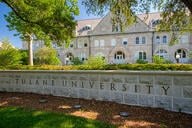You have /5 articles left.
Sign up for a free account or log in.
Providence College announced late Wednesday that, under certain conditions, it would permit a lecture by a philosopher who is an advocate of same-sex marriage. And the college now says that, when it canceled the appearance of John Corvino, it was really trying to reschedule the event, not call it off.
While Wednesday's announcement clears the way for Corvino to appear on the campus, it may not resolve issues raised by the incident, such as the college seeming to impose a requirement that all speakers on controversial topics have a rebuttal speaker, and whether the college is applying to academic speakers rules set by Roman Catholic bishops for politicians.
Corvino -- chair of philosophy at Wayne State University and a proponent of same-sex marriage -- was to have appeared at the college. He is a popular speaker on many campuses, and frequently appears with those who disagree with his position. Organizers of his Providence appearance, when told the college was concerned that he would express views inconsistent with Catholic teachings, added Dana Dillon, a theologian at the college, to the program. She was to speak immediately after Corvino, and to offer a Catholic perspective.
In barring the talk, Hugh F. Lena, the provost, said that Dillon didn't have enough time to prepare. As a result, Lena said, the talk would violate the college's rule (not previously known to many on campus) that "both sides of a controversial issue are to be presented fairly and equally." Further Lena said that the college needed to apply the teachings of a 2004 document by the Catholic bishops -- "Catholics in Public Life" -- which concerns political figures.
Lena's explanation angered many at the campus, who said that he was citing a Catholic document that has nothing to do with academic presentations, that he was changing the rules for organizing events, and that he had insulted Dillon by implying that she lacked the ability to respond to Corvino.
Alumni and others have posted many critical comments on the college's Facebook page, a new group called "Fighting for Academic Freedom" was created, and petition drives have been launched. Facebook posts said that the college was treating its students like sixth-graders. One critic asked: "Hey Providence College, when is the next scheduled book burning?"
In his statement Wednesday, Provost Lena announced that Corvino would be coming to the campus sometime in the spring, and that he would appear with Sherif Girgis, a Ph.D. student in philosophy at Princeton University and a J.D. candidate at Yale Law School. Girgis, Lena said, could respond to the legal and philosophical issues Corvino would discuss.
Further, Lena said that he regretted the way his initial action was seen as reflecting on Dillon. "However, the administration felt that it was unfair to ask Dr. Dillon, a theologian, to debate opposite someone who would be presenting philosophical and legal arguments, not theological ones. Just as our cancelation of the original event had nothing to do with Dr. Corvino, neither did we mean to imply that Dr. Dillon was incapable of debating the issue," he wrote. "I apologize to Dr. Dillon if our intent was not clear or was misinterpreted in any way."
The statement didn't reference "Catholics in Public Life." A spokesman for the college said in an interview that nothing should be read into the decision not to mention that statement. "The administration felt the document was relevant in the case," he said, noting that gay marriage is a political issue.
Via e-mail, Corvino said: "In 20 years of speaking, at over 200 campuses, I've never had an invitation so abruptly revoked and then reinstated. And while the provost says that it has nothing to do with me, it has of course had an effect on me. Nevertheless, I look forward to going to Providence to debate my friend Sherif Girgis." He also said that he was not willing to go along with the idea that his lecture planned for this week was only being rescheduled.
In a blog post this morning, Corvino said that real damage has been done by the way Providence handled the situation. "The truth is that it’s difficult not to feel as if the Providence College administration regards me as a sort of virus, which might infect students if not blocked by some administration-approved surgical mask. This feeling is sadly familiar, to me and to any gay person. It is the malaise of the closet, the notion that some features of oneself are unspeakable. I am the Other. And if I feel that way, I can only imagine how young gay, lesbian, bisexual, or transgender Providence College students must feel. It is for them that I remain most concerned," he wrote.
While Corvino has now been cleared to speak at Providence, the various statements of the provost have raised concerns for many.
A letter from Fred K. Drogula, associate professor of history and president of the Faculty Senate, has circulated on campus and been posted to Facebook. "The college practice used to cancel this event -- namely that 'both sides of a controversial issue are to be presented fairly and equally when discussed in a forum such as this' -- is full of potential concerns for our faculty. Are all addresses on controversial topics henceforth to require two speakers? Will every talk given at the Center for Catholic and Dominican Studies henceforth provide a second speaker to give the 'other' side of any important issue?" Drogula wrote. "This expectation seems to suggest that we faculty are helpless, passive listeners who have no choice but to accept what any speaker tells us about a controversial topic. Our faculty contains thinkers from the best graduate programs in the world, and includes an excellent theology department and a priory of Dominican friars -- are we not capable of challenging one speaker if we find biases, inaccuracies, weaknesses, or equivocal statements in his or her presentation? Do we need a second speaker to defend us from controversial ideas, or can we engage speakers ourselves and argue with them?"
Further, Drogula questioned how the college has discussed the issue. "There are blatant errors of fact in the official college statement on our webpage, which seem a violation of the college motto Veritas," he wrote. "For one, the statement asks whether the college should have given the speaker 'an unchallenged platform.' As the publicity for the event made clear, however, our own Dr. Dana Dillon of the theology department was scheduled to give a response to Dr. Corvino’s paper. Dr. Dillon holds a Ph.D from Duke University and specializes in moral theology, so it seems incredible to say that Dr. Corvino’s presentation was to be 'unchallenged.'"
Via e-mail Drogula said that while he is pleased Corvino may appear, there are many issues that need to be discussed. "I think this reversal is good for our campus and for academic freedom, but I certainly don't think everything is resolved," he said. "The faculty are asking why the administration thought it was acceptable to treat us in this manner and to place highly questionable restrictions on our academic freedom in the first place. Faculty and students alike are also deeply concerned about the damage this incident has done to the reputation of the college, and whether we will have to face similar limitations on our academic freedom in the future."




